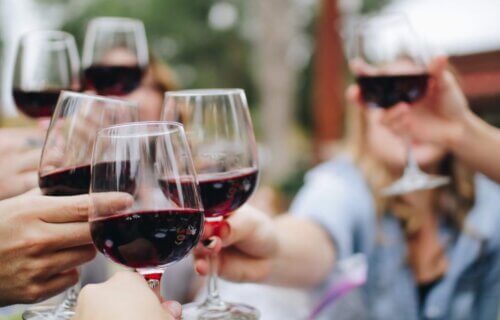CHICAGO, Ill. — What makes a glass of alcohol a harmless indulgence for one person but a gateway to addiction for another? A new study is debunking the myth that alcoholics don’t like alcohol, but can’t stop drinking. Researchers from the University of Chicago Medical Center say drinkers with higher sensitivity to alcohol’s pleasure-giving effects are more likely to suffer from alcohol use disorder (AUD).
The 10-year study examined alcohol’s impact on 190 young adults in their 20’s and 30’s. Researchers discovered that individuals who experienced the highest amount of pleasurable stimulation, liking, and wanting more alcohol were the likeliest to develop a drinking problem within the 10 years. The study also reveals the participants who became alcoholics did not gain any tolerance to these pleasurable effects. In fact, their stimulation actually increased by the end of the experiment.
Study authors say previous reports on drinking have focused on alcohol’s ability to tranquilize and impair motor functions. This new report finds these symptoms don’t appear as strongly in drinkers who gain more pleasure from alcohol.
“Prior longitudinal studies have looked at young drinkers’ response to alcohol and focused primarily on the fatiguing and impairing effects of alcohol,” says lead author Andrea King, PhD in a media release. “The thinking that alcoholics do not like the effects of alcohol over time is based on ad-hoc reports of patients entering treatment. Only by testing the same people over a substantial amount of time to see if alcohol responses change over time were we able to observe this elevated response to alcohol compared with placebo, and in participants who did not know the contents of the drinks, so expectancy effects were minimized.”
Predicting alcoholism
Researchers find that testing a person’s sensitivity to alcohol’s ability to create a sense of euphoria can help scientists predict who will develop AUD years later.
“These pleasurable alcohol effects grow in intensity over time, and do not dissipate, in people progressing in excessive drinking,” King explains. “This tells us that having a higher sensitivity to the rewarding effects of alcohol in the brain puts such individuals at higher risk for developing addiction. It all fits a picture of persistent pleasure-seeking that increases the likelihood of habitual excessive drinking over time. Alcoholics were thought to need to drink more to finally get their desired effect when they drink, but these well-controlled data do not support that contention. They get the desirable alcohol effect early in the drinking bout and that seems to fuel wanting more alcohol.”
The study looked at regular light or heavy social drinkers starting in 2004. Researchers tested their response to alcohol in a lab five and 10 years later. The team also interviewed the participants annually to keep track of their drinking habits and measure their symptoms of AUD.
Disproving the theories behind problem drinking
Study authors say their results show that age-old theories about why people become alcoholics may be incorrect. Traditionally, King says the belief has been that alcoholics don’t like alcohol but they can’t stop themselves from drinking.
“Our results support a theory called incentive-sensitization,” the professor of psychiatry and behavioral neuroscience at UChicago Medicine adds. “In response to a standard intoxicating dose of alcohol in the laboratory, ratings of wanting more alcohol increased substantially over the decade among the individuals who developed more severe AUD. Additionally, the hedonic response — essentially, how much a person liked the effects — remained elevated over this interval and didn’t go down at all.”
Study authors hope the results will help improve how health care professionals look at alcohol addiction. They add it may lead to better, individualized treatment for AUD and help physicians spot who’s at risk for addiction.
“I’m already using this information to inform how I talk about addiction with my therapy clients,” King notes. “It can be frustrating for them to see other people who can have a couple drinks and just stop there. They can’t understand why they repeatedly seem unable to do that, too, and I tell them, it may be because your brain responds differently to alcohol that makes it harder to stop drinking once you start. Knowing that information can empower a person to make different decisions. Even with our current pandemic, a person may drink to cope with stress or reduce negative feelings, but that doesn’t mean that they don’t also experience the buzz, or pleasurable effects from drinking. This is most concerning for at-risk drinkers as those responses may intensify as they progress with heavier drinking.”
The study appears in the American Journal of Psychiatry.
